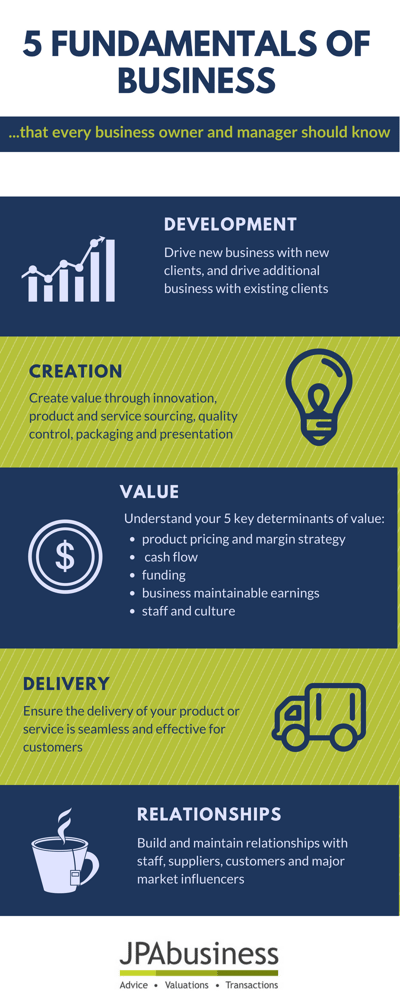The following information is a distillation of the things many of our best clients do on any given day of the week, presented here as a simple infographic.
These fundamentals are not necessarily sequential, instead they often overlap and run in parallel, and also inform and interact.
Now let's take a look at these fundamentals one by one. (For more detail, you can download our free eBook: 5 key business fundamentals – What every successful business owner needs to know.)
Development
Development is all about what is coming in the door:
- What does your pipeline of clients, potential clients and customers look like?
- How solid is your referral base?
- How much profile does your business have?
- Does it naturally attract customers?
- Does it have a good profile online, as well as offline?
- What is the make-up of prospects versus leads versus quotes versus tenders pending acceptance versus jobs won?
The development fundamental challenges you to consider how vibrant your business is in driving new business with new clients, or additional business with existing clients.
Creation
The creation fundamental refers to ‘what it is you actually do that gains the interest of the customers you sell to’.
The creation process is the engine room of what a business does and how it makes money.
Creation has a number of components, including:
- Innovation
- Product and service sourcing
- Quality control
- Packaging
- Work in Progress.
Delivery
So you’ve created the product or service you’re known for. But that’s not enough. The job’s not done!
There must also be a focus on the next business fundamental – delivery – and ensure the experience (including both product and service) is seamless and effective for customers. To achieve this you must ask:
- How is my product or service delivered to the client?
- What is the level of customer interaction through that process?
- How is shipping, freight and transport managed and maintained?
- How, in particular, are time and customer expectations managed, met and maintained?
A smart business owner will peer into the delivery processes within their business on a periodic basis to get a sense of how that process is going.
Often an average product, if delivery is done well, can surprise and delight a customer.
Often an above-average product, if delivery is done poorly, can annoy and frustrate a customer.
And remember, it’s often the little things that will most annoy. Left undone or not rectified, these can ultimately lead to loss of a customer.
Value
A business owner needs to constantly consider: “What is my strategy and how do I provide and extract value from the things I do in my business?”
5 key determinants of value are:
- Product pricing and margin strategy
- Cash flow
- Funding
- Business maintainable earnings
- Your people and your culture.
Relationship
The last fundamental a business owner needs to focus on is relationship.
This involves constantly thinking about the business and brand you’ve built, and the aspects of your business that are plain to see in the market place, and asking:
- What relationship do I have with my people, my team, my suppliers, my customers and other major influencers in my market?
- How is my brand perceived by those key audiences?
- Is it cherished, trashed, known, unknown?
- What is it known for?
- Does that perception fit with my direction?
I hear a lot of business owners says “there’s no loyalty anymore”, “customers move from one supplier to the next with no compulsion”.
I don’t believe that. In fact I believe today’s market is more about loyalty than perhaps ever before.
The complexity is that there is greater competition.
So your brand and your business needs to manage its portfolio of relationships with its customers, suppliers, internal team, influencers, likely referral sources and advocates for your business.
Free resources
We have produced a number of free resources to help business owners and managers understand and manage these key business fundamentals:
- Business value drivers eBook
- Managing staff for high performance eBook
- Brand and corporate identity for small to mid-sized businesses eBook
- Cash flow management for small to mid-sized businesses eBook
- Staff Training Plan template
- Professional Development Plan template
- Working capital checklist.
These are just some of the resources available. Take a look at our Resource Library for the full list.
If you would like to talk to a business advisor about any aspect of your business' management, contact the JPAbusiness team on 02 6360 0360 for a confidential, obligation-free discussion.
 James Price has over 30 years' experience in providing strategic, commercial and financial advice to Australian and international business clients. James' blogs provide business advice for aspiring and current small to mid-sized business owners, operators and managers.
James Price has over 30 years' experience in providing strategic, commercial and financial advice to Australian and international business clients. James' blogs provide business advice for aspiring and current small to mid-sized business owners, operators and managers.


